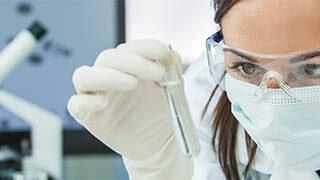
NEWBORN SCREENING SAVING BABIES FROM LIFELONG LEARNING DISABILITY
In babies with congenital hypothydroidism (CHT) the thyroid gland may not be fully developed or positioned. Problems with the production of the hormone thyroxine, or very low levels of thyroid stimulating hormone, can also cause CHT.
If left untreated, this condition can cause lifelong physical, developmental and learning disabilities and children affected may need lifelong care. Yet the condition is easily treatable with a synthetic form of thyroxine.
In 1978, Action funded a one year pilot study led by the late Professor Barbara Clayton at Great Ormond Street Hospital. By using the ‘heel prick test’ (now known as Newborn Screening) more than 92 per cent of babies with CHT were diagnosed before symptoms became apparent.
Following this research, which was extended following funding from the Medical Research Council, CHT screening was introduced for all newborn babies in the UK in 1981.
Around 270 babies are diagnosed with CHT every year in the UK and, with treatment starting approximately 14 days after birth, it is estimated that of these, 32 babies are saved from lifelong learning disability.

